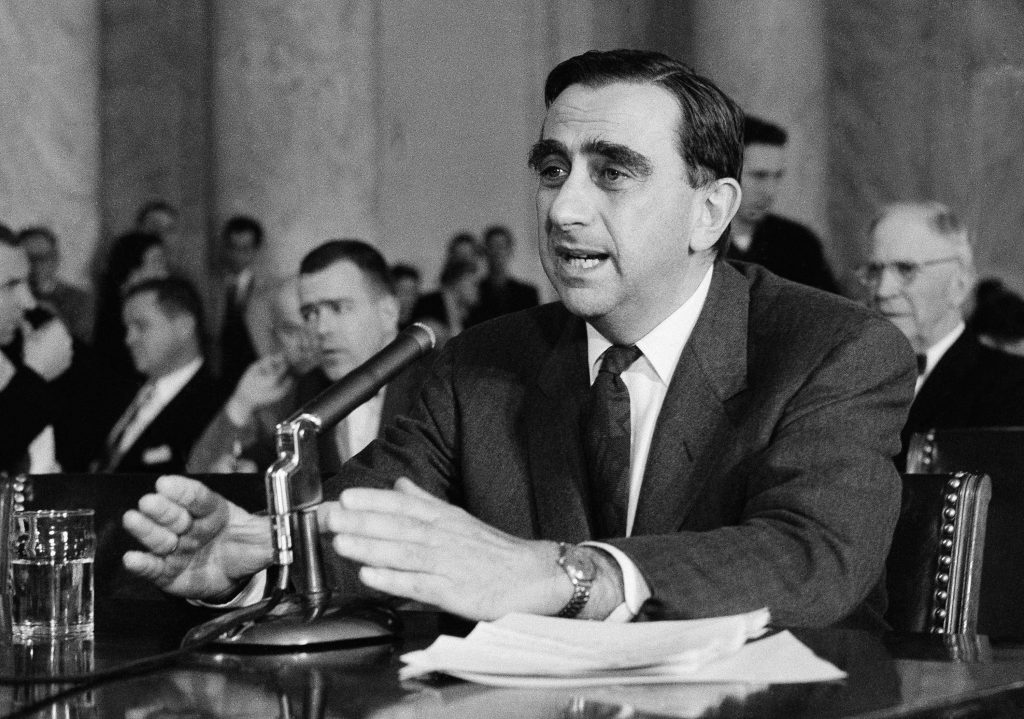The Red Scare
The political conflict known as McCarthyism or the "Red Scare" began around 1949, soon after the Soviets tested their first atomic bomb and the arms race began between the U.S. and the Soviet Union. Coming during the height of McCarthyism, the effect of "Joe-4" was most pronounced by the security hearings in early 1954, which revoked J. Robert Oppenheimer of his security clearance on the grounds that he was unreliable, had not supported the American hydrogen-bomb program and had made long-standing left-wing ties in the 1930s. In reality, after World War II, Oppenheimer lobbied vigorously for international control of atomic energy, proposing that the Soviet Union and the United States submit to a supranational organization designed to allow sharing of peaceful atomic energy information while keeping weapons development to a monitored minimum. These hopes fell through when policymakers presented plans that would obviously keep the Soviets out of the atomic picture. The Russians unceremoniously rejected the proposal in 1946.
In 1947, when the Atomic Energy Commission was formed as a civilian agency to oversee U.S. atomic affairs, Oppenheimer was unanimously elected chairman of its General Advisory Committee. There, he resisted efforts pushing to develop the hydrogen bomb on grounds both political and technical. During the late '40s, as the first lines of the Cold War were drawn and concerns about Communist infiltration were beginning to build, Oppenheimer's security problems centered on events from the war period, surrounding what was known as "the Chevalier incident." In August 1943, many of his graduate students were under investigation by the Army's counterintelligence agency for left-wing sympathies and conspiracies. Oppenheimer had been approached months earlier by "intermediaries" for an official at the Soviet consulate, who discussed passing on secret work being done at Berkeley. Oppenheimer declined to share such information and later refused to identify most of the men to General Leslie Groves, saying they posed no security risk, but he was grilled unsuccessfully for their names. Shortly thereafter, Groves was reassured that Oppenheimer was honest about never having been a Communist and would not permit Communists to interfere with the success of the bomb project.

Ironically, despite his enormous contributions to the American nuclear program, Oppenheimer was used as a scapegoat, with some "superpatriots" calling him a "hardened communist" and a spy. In his role as a political advisor, Oppenheimer had made numerous enemies. The FBI-which had been following his activities since before the war, when he showed Communist sympathies as a radical professor-were willing to furnish Oppenheimer's political enemies with incriminating evidence about Communist ties. These enemies included Lewis Strauss, an AEC commissioner who had long harbored resentment against Oppenheimer for humiliating Strauss before Congress years earlier. Strauss and Senator Brien McMahon, author of the 1946 Atomic Energy Act, pushed President Eisenhower to revoke Oppenheimer's security clearance.

Edward Teller participated in the security hearing as the only major scientist to testify against Oppenheimer, a role that resulted in his virtual expulsion from the physics community. Teller told the FBI that Oppenheimer's opposition to the H-bomb had delayed the project's progress, despite the fact that other notable scientists such as Hans Bethe and James Conant had also opposed its development. The FBI went so far as to tap Oppenheimer's home telephone, listening in on conversations with his attorneys and providing the transcripts to the AEC, which was supposedly conducting an impartial inquiry into the charges against Oppenheimer. Many top scientists, as well as government and military figures, did testify on Oppenheimer's behalf. Still, inconsistencies in his testimony and his erratic behavior on the stand convinced some that he was unreliable and a possible security risk. In 1953, Oppenheimer was suspended from the nuclear bomb program as a security risk, his voice against the Cold War silenced. In 1963, President Lyndon B. Johnson attempted to redress these injustices by honoring Oppenheimer with the Atomic Energy Commission's prestigious Enrico Fermi Award. Similarly, in the Soviet Union, Sakharov was exiled to Gorky on the trumped-up charge of being a CIA informant and was later rehabilitated.
During his hearing, Oppenheimer testified willingly on the left-wing behavior of many of his scientific colleagues. Some speculated that if Oppenheimer's clearance had not been stripped, he would have been remembered as someone who had "named names" to save his own reputation. As it happened, Oppenheimer was seen by most of the scientific community as a martyr to McCarthyism, an eclectic liberal who was unjustly attacked by warmongering enemies, symbolic of the shift of the scientific creativity from academia into the military.